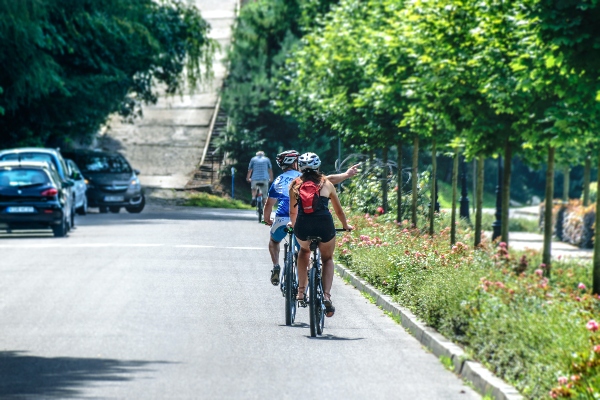The Scribbick family makes exercise a daily priority.
By Kelly A. Goff
Photography by Robert French
Aidan, Finn and Sine Scribbick run three miles four to five times a week. They follow that with core abdominal work and stretching, such as flutter kicks and tuck ups on a bar. Weekends usually include at least one four-mile bike ride to the pool, time spent swimming and then a cycling trip home. The two boys, Aidan and Finn, dive two to three hours five days a week after school.
Aidan is 12-years-old, Finn is 10 and their sister Sine (pronounced shi-NAY) is 8.
Future Olympians you say? Perhaps. But that’s not the reason for the regimen. For that, one must look to their parents, Frank and Arie Scribbick.
“My philosophy is exercise should be done daily, just like eating and sleeping,” says Frank Scribbick, M.D. “If I had to choose between eating, sleeping or exercising on a particular day, I would choose exercise.”
Frank’s attitude toward exercise developed after he left home for college. His activity level went down, his natural teenage metabolic rate also declined and his weight shot up. “I knew from older, heavier family members that I was at a crossroads,” he recalls. “I could change my lifestyle and lose the weight before it got harder, or go down the road of several other relatives and, frankly, most Americans. I chose the former. I changed my major to nutrition science and began exercising daily — a lifestyle change that has not stopped to this day.”
Frank likes to do an hour of low-impact cardiovascular exercise each day, lift weights three times a week and swim four to five times per week.
The children’s mother, Arie, (pronounced AHR-ee-ah), is also a physician. Blessed with a quick metabolism, she prefers a more laid-back approach when it comes to her personal fitness. “I used to do a lot of running and tennis. Now I mostly ride horses and run a few times a week,” she says.
Active play
The Scribbicks started emphasizing fitness when their children were of preschool age — not in a regimented way but more through encouraging active play. “When I say ‘play’ I want them to think of it as a verb,” explains Arie. “Like go ride a bike, jump on the trampoline, swim or play football — it doesn’t mean hook up the video game to the TV and sit down.” As you may have guessed, the Scribbick household does not harbor any video games, but the family does have a television.
So what’s their secret to getting the kids off the couch and moving — bribery? Some might call it trickery; Frank prefers to think of it as pre-planning. “I often grab the kids and say we’re going for a bike ride. Then we end up at the swimming pool where I have conveniently packed their swimsuits.” Frank says now they sometimes try and search him for swimsuits before they will get on their bikes. “They usually always whine a bit before going,” admits Frank. “But once we’re riding down the road or playing in the pool, they’re laughing and having fun.”
Arie says making fitness a family priority takes parental involvement. “You have to set an example. My parents used to tell me not to smoke while they were chain smoking. Kids see right through that kind of hypocrisy,” she advises. As for kids’ resisting participating in physical activity (or cleaning the house for that matter), Arie says it’s easier to overcome when you’re doing the activity with them. “It comes down to the old ‘do as I do, not as I say’ adage.”
The deep end of discipline
You may be wondering how ‘active play’ turned into three hours of dive practice a day. When Finn was four-years-old, he loved trying flips and jumps into the Alamo Heights swimming pool. His daredevil dips made other parents worry he would get hurt, so Arie and Frank decided to consult a diving instructor. The instructor thought Finn was too young for the sport but agreed to evaluate his skills on a trampoline.
Little did he know Finn had been bouncing away at home on their backyard trampoline. “The coach was very surprised at his flipping ability at that age,” Arie laughs.
Aidan got bored watching his younger brother dive and decided to join him. Now the two boys are part of San Antonio Divers team. They train at the Josh Davis Natatorium at Blossom Athletic Center and have been competing nationally for a number of years. This past September the boys traveled to Shanghai, China, to be a part of the national team at the Amateur Athletic Union National competition.
While they do sometimes miss the opportunity to play other sports like football or baseball, both boys enjoy making friends with a common interest from all over the country. Arie says the chance to travel throughout the U.S. and abroad has been good for the entire family.
Although diving isn’t mainstream, it is a great sport for developing focus and self-confidence. “It’s just you and the board; without focus the results can somehow become painful. And because it’s a subjective sport with judging, the children learn there are nuances to what people perceive as ‘better,'” observes Arie. “I think these disappointments now can strengthen their personalities for bigger ‘judgments’ they will face as young adults and adults.”
Gift of a lifetime
As physicians, both Arie and Frank deal daily with the devastating effects of obesity. Diabetes and cardiovascular disease wreak havoc on the bodies of millions of Americans, two-thirds of whom are overweight. One-third of U.S. children are also overweight. “The tsunami of childhood obesity has not yet hit the shore — it takes many years for complications to develop,” says obesity researcher David Ludwig of Children’s Hospital, Boston. “Imagine heart attack or kidney failure becoming a relatively common condition of young adulthood.” Ludwig is a key researcher in a report published in the New England Journal of Medicine that conservatively estimates obesity now reduces average life expectancy by about four to nine months. Additionally, researchers predict that if the current epidemic of child and adolescent obesity continues unabated, life expectancy could be shortened by two to five years in the coming decades.
Frank says the chances of an obese child or young adult actually getting to normal body weight is almost zero. “The sooner children become aware of this the better. We don’t have any problem warning them about the dangers of drugs and smoking at an early age, but we give lip service to food choices and physical activity,” he says. “We live in a food-toxic environment, while at the same time becoming less and less active. If parents even thought their kids were going to a toxic school or toxic playground, there would be a loud outcry.” Couple this with the fact that ‘play’ for children has taken a turn for the sedentary, and throw in calorie-dense snacks they can munch on while pushing video game buttons, and you have a serious public health problem.
Perhaps part of a growing minority, the Scribbicks are taking their parental responsibilities seriously by reinforcing behavioral changes until they become permanent. For example, when his kids whine about running and say, “Why do we have to run today? We ran yesterday.” He replies, “Did you eat yesterday, and do you plan to eat today?”
More than fond memories, the Scribbicks hope their kids develop a lifestyle that seamlessly incorporates fitness, regardless of the activity they chose. Arie likens their emphasis on physical activity to music lessons, “Kids don’t like it while they’re doing it, but once they become adults, they appreciate having that talent.”






